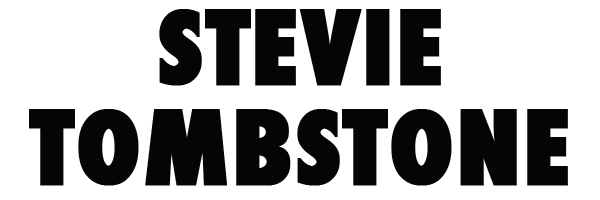
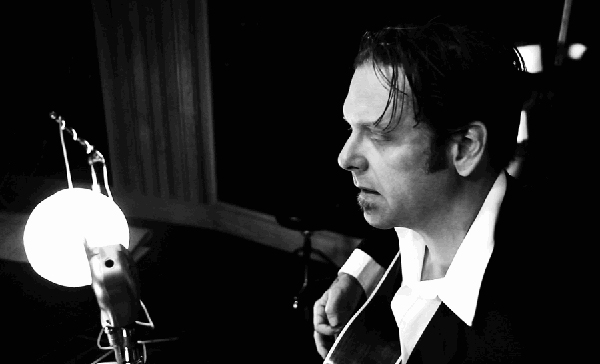
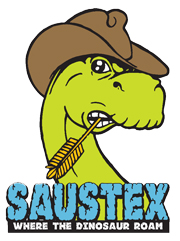
Q: You’ve said before that in your early teens you were involved in gospel music as a vehicle to get out of the house and meet girls. Tell us a little more about that…
A: We lived near New Hope Georgia at that point in time. I was in my mid- teens I guess. There wasn't a whole lot to do so I would sit in with bluegrass players and play along with the radio. Eventually the church down the road asked me to play guitar with their band that played every Sunday, you had to go to youth meetings and outings as well. This was pretty much the only way to socialize outside of school especially with the opposite sex. I guess you could say I dipped in the the offering plate one too many times, it didn't help that I wouldn't cut my hair or take out my earrings either. They asked me to leave after a few months.
Q: You did most of your real growing up in Atlanta in the early and mid- 80’s---forming your band the Tombstones, living at the Metroplex club, booking the White Dot and generally running with a fast and loose crowd; playing with and meeting many of the big names in the American Underground at that time. Do you think there is still a legitimate “Underground”?
A: That's a hard one. I don't think the underground is around as we knew it. Everything has been done, categorized, regurgitated and exploited. I think there is an underground that's splintered among several different genres. There are a lot more bands now than before and anybody with a p.c. can make a record. We won’t see the underground of today fully until we are looking back on it.
Q: Who stands out in your mind from that era as true originals and influences?
A: I remember the first time I saw the Gun Club I was blown away. Same with Tex & the Horseheads and Evan Johns. They all had elements of roots music I had grown up on . I could identify with them right off the bat. That was a good time for music with the Ramones, T.S.O.L., Social Distortion. The Atlanta scene was flourishing at the time as well on a whole different level.
Q: After surviving the rough and tumble chaos of your life in the 80’s and early 90’s, (substance abuse, bad relationships, shady management, broken record deals, etc.) did you consider getting out of music all together?
A: I'd be a lying if I didn't say I consider it every once in a while. All the bullshit that comes along with the business has made me who I am to a large degree but there is more to life as well. I love to perform, write and produce. I don't think I'll ever stop, I have a lot of territory yet to cover.
Q: Do you find it ironic that you’re now playing and writing tunes that musically and lyrically bear more resemblance to country and gospel?
A: I think its clichéd but comforting at the same time. I've definitely come full circle so to speak. Whatever natural ability I have sprang from those roots and it’s the surest way to deliver a simple message if that's what you are going for.
Q: Did that shift back to a more organic style involve a reassessment of your musical influences and philosophical role models?
A: It was a slow process that caused me do a lot of back tracking and a lot of experimentation . Revisiting my early influences gave me a whole new perspective and appreciation. I was trying to escape a stereotype I had created for myself as just a rock guitar player and general screw up so it involved a lot of research and artistic risk in the midst of everything else. There is a whole lot less to hide behind in an organic environment.
Q: Much of the material on “Devils Game” was lifted from “Second Hand Sin” – which was recorded and produced by Jeff Johnson of Jason & the Scorchers – tell us a little about how that came together…
A: That session is largely biographical ...Jeff was a Tombstone for a while during a hiatus from the Scorchers. He late rejoined the Scorchers and we crossed paths again. I was just coming out of a particularly dark period of my life and had a lot of material to show for it. The Scorchers hired me as a guitar tech in the states and later added me as support act on a European tour. The tour gave me more perspective and gave Johnson and myself the opportunity to hone my song list on a different audience in a different country almost every night. Quite a large laboratory! When we got back to the states we recorded “Second Hand Sin” with that vibe fresh on our minds as well as all the trouble that came before.
Q: Do you think you achieved the sound and feel you were looking for on “Sin”?
A: I took a lot of chances on that disc that where a little out of character but it was great experience especially in hindsight as far as being a producer is concerned. “Second Hand Sin” is definitely not a slick record but the feeling is there for sure. While in Paris I watched some show about Blue Note Jazz. The music and photography really struck me.
That really set the tone for the feel on my end. We really just wanted to make a musical sketch book with some works in various states of underproduction. We were definitely going for the art end if it all rather than competing with what we heard on the radio.
Q: You currently live in Austin and just became a father for the first time----do you sense any additional change in perspective?
A: Well it definitely made me reassess my goals. It’s not all about me anymore, I have a great marriage and a new child, two things I never thought would come to pass. It definitely gives me a lot of inspiration for the future.
Q: What are you currently working on/ pursuing?
A: Right now I’m working on some new tunes for next year’s release. I had a half a lifetime to write “7:30 a.m.”, I didn't see any reason to rush the next one. It will probably be more of a concept piece, more organic. Being married to my bass player is most convenient for writing and arranging at home so the pace has picked up a bit lately. I have two other projects that I'm involved with as a guitarist, the Hickoids and Black Eyed Vermillion, both are in the studio as well.
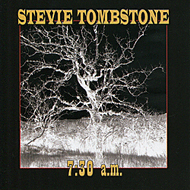
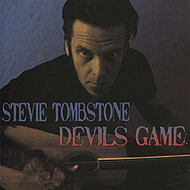
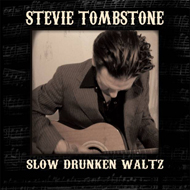
STEVIE TOMBSTONE
"7:30 A.M." CD
$10 + S & H
STEVIE TOMBSTONE
"DEVILS GAME" CD
$10 + S & H
STEVIE TOMBSTONE
"SLOW DRUNKEN WALTZ" CD
$10 + S & H